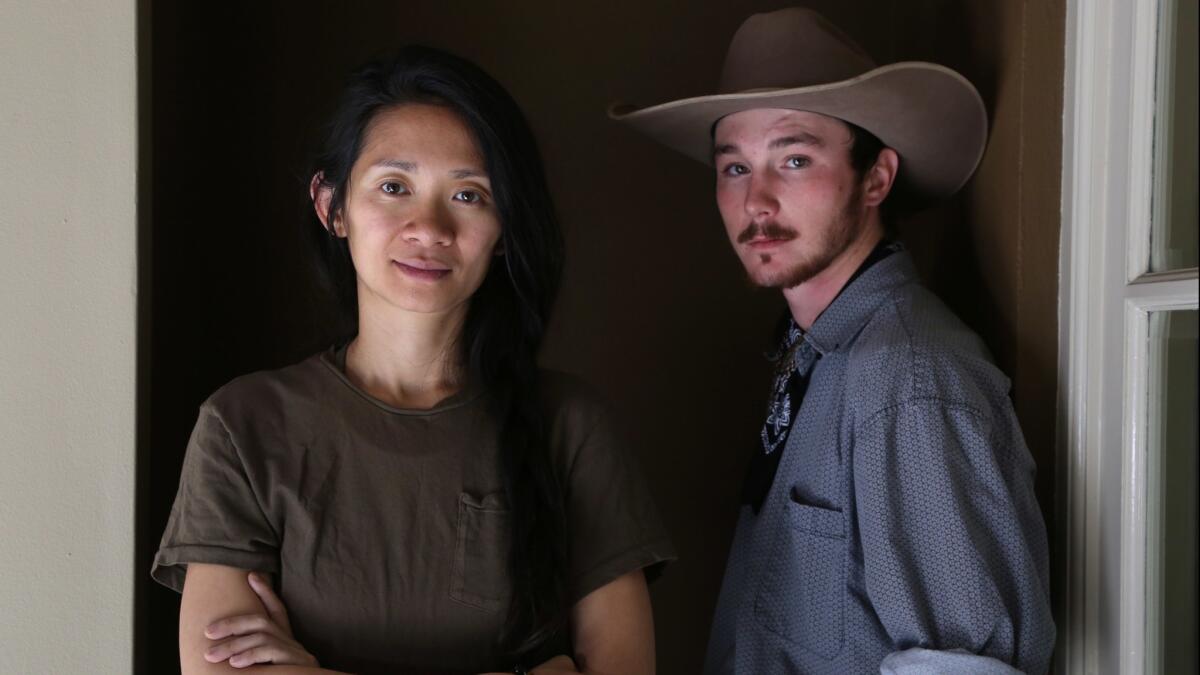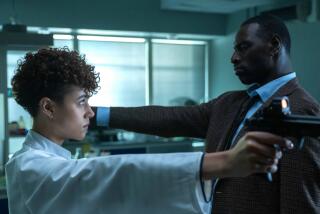How a cowboy from South Dakota and a filmmaker from Beijing came together on the critically acclaimed indie ‘The Rider’

Born in Beijing in 1983, filmmaker Chloé Zhao wasn’t exposed to any American movies until the mid-1990s, when China began to open itself up to the West. Once she was, she quickly became entranced. “When Western culture came in, it was like a tsunami because we’d been closed off for so long,” Zhao says, rattling off the titles of films she remembers seeing: “True Lies,” “Sister Act,” “Aliens,” “Indecent Proposal,” “Pretty Woman.”
Growing up in South Dakota on the Pine Ridge Oglala Lakota Reservation, Brady Jandreau didn’t give a whole lot of thought to movies. Living out on the windswept plains, he spent most of his childhood around horses. He was placed on a horse for the first time when he was just 15 months old; by 12, he was training wild horses, and by 20, he had made his name on the rodeo circuit riding broncos. “My part of the world — it’s like time forgot it almost,” Jandreau says.
That Zhao and Jandreau — raised on opposites sides of the planet but equally distant from Hollywood — ended up collaborating on one of the most critically acclaimed films of the year is a turn of events so seemingly unlikely, if it was a movie, you might not believe it.
In a story that echoes his own life, Jandreau stars in Zhao’s poetic drama “The Rider” — now in limited release in New York and L.A. before expanding nationally — as a Lakota bronco rider named Brady Blackburn who suffers a debilitating head injury when he is thrown from a horse during a rodeo competition. Warned by his doctor that a return to riding could kill him, Brady struggles with how to move on from the one thing that gives his life the most meaning.
Since its debut at last year’s Cannes Film Festival, where it earned the top prize in the director’s fortnight sidebar, “The Rider” has steadily racked up plaudits. After successfully galloping through a series of other film festivals, including stops in Telluride, Toronto, New York and Sundance, the movie picked up five nominations at last month’s Film Independent Spirit Awards, including best feature and best director.
“The Rider” also ranks as the year’s top title to date on review aggregator Metacritic.com, with a score of 92. In his review of the film, Times critic Justin Chang wrote that it “comes as close to a spiritual experience as anything I’ve encountered in a movie theater this year.”
It’s a movie that I think will play deep into the summer. This is a word-of-mouth movie so you’re not going to be bumped out of the theater.
— Sony Classics co-president Tom Bernard on prospects for “The Rider”
Still, for all the acclaim it has received, Zhao is well aware that a small-scale film such as “The Rider” — the cast of which consists entirely of non-professional actors, including Jandreau’s father, Tim, his sister Lilly and several of his friends — is in a lopsided battle for attention against studio behemoths such as Dwayne Johnson’s “Rampage” and the upcoming “Avengers: Infinity War.”
“We don’t really have any expectations,” says Zhao, 35, who covered the film’s modest production cost herself, using her credit cards and those of the film’s cinematographer, Joshua James Richards, who is also her boyfriend. “A film like this will find its place as time goes on. I’d rather make a film that has a longer shelf life than an initial boost anyways.”
She laughs. “I’m a pessimist. People ask me, ‘Are you glass-half-full or glass-half-empty?’ I have no glass. Everything is gone, the glass is broken. My boyfriend always says, ‘Can you not enjoy any of this?’ I don’t know. I’m just that kind of person. I get anxious every time I get a good review because all I can think about is the bad one that follows. The other shoe is going to drop.”
“The Rider” opened over the weekend with a solid per screen average of $14,081 from three theaters. For his part, Sony Classics co-president Tom Bernard is sanguine about the prospects for the film both as counterprogramming to the coming onslaught of bigger, noisier tentpole fare and as a potential awards season contender down the road.
“It’s a very unique story, and I think it has universal appeal,” Bernard says. “It’s a movie that I think will play deep into the summer. This is a word-of-mouth movie so you’re not going to be bumped out of the theater, and I think you’ll be able to establish yourself so you’ll be able to play on.”
Zhao and Jandreau first met in 2015 on the Pine Ridge Reservation, where Zhao — who left China at 15 to attend boarding school in London and went on to study filmmaking at New York University’s Tisch School of the Arts — had shot her low-budget debut feature, “Songs My Brother Taught Me.”
Struck by Jandreau’s soulful face and the sensitive way he worked with horses, Zhao thought he had the makings of a leading man in spite of the fact that he had never acted before.
“Right away, I called [Richards] and said, ‘I think I met someone who can carry a movie,’ ” Zhao says. “The way he trains horses was what convinced me the most. To see him act like a father, like a mother, like a friend, like a dance partner to a wild animal and get that animal to trust him — I figured maybe he could do that for the camera as well.”
In April 2016, Jandreau was thrown violently from a bucking horse during a rodeo competition. The horse stepped on his head, and after arriving at the hospital he went into a seizure, was put into an induced coma for three days and underwent surgery.
“When I was laying in that hospital bed, when I woke up, I couldn’t even talk right,” says the 22-year-old Jandreau, who has a metal plate in his head from the accident. “I didn’t know if I would ever be able to do what I loved again. But two weeks after I was home, I rode Gus and I cried — it meant that much to me. When I first looked down those ears again, it was really powerful. I knew that there was nothing else that I could be.”
Inspired by Jandreau’s perseverance, Zhao decided to build her next film around him, lightly fictionalizing certain aspects of his story but staying true to its spirit. (Actual footage of Jandreau’s accident is used in the film.) To help guide his performance, she showed him Darren Aronofsky’s underdog drama “The Wrestler” and a few films starring River Phoenix. “I really tried to treat him like an actor,” she says. “Everything I would probably do with a professional actor, I did with him.”
Two years after his injury, Jandreau no longer participates in rodeo competitions; along with his own safety, he now has a wife and nine-month-old baby to consider. But he does still train horses, and in the wake of “The Rider,” he’s looking to do more acting and going on auditions. “I figure it’s worth a whirl,” he says. “I mean, a lot of people have told me I did pretty good.”
Buoyed by the accolades for “The Rider,” Zhao is developing two new projects: a historical Western about Bass Reeves, who was the first black deputy marshal west of the Mississippi River, and a sci-fi film set in China. At a time when many filmmakers are leaping straight from low-budget arthouse fare to the tentpole realm, she doesn’t rule out taking on, say, a giant comic-book movie someday. “I love the guys at Marvel,” she says. “I grew up with manga. I have a soft spot for that stuff.”
But whatever she does in the future, she says, like “The Rider,” it will be grounded in universal emotions and struggles.
“It’s extremely important for me as a storyteller to relate as a human being first,” she said. “The things that I have that you also have are what interests me. We live in a time when there are labels everywhere, and a lot of times we get to know people through these labels. I’m glad that the initial connection between Brady and I was just as two human beings.”
Twitter: @joshrottenberg
More to Read
Only good movies
Get the Indie Focus newsletter, Mark Olsen's weekly guide to the world of cinema.
You may occasionally receive promotional content from the Los Angeles Times.











